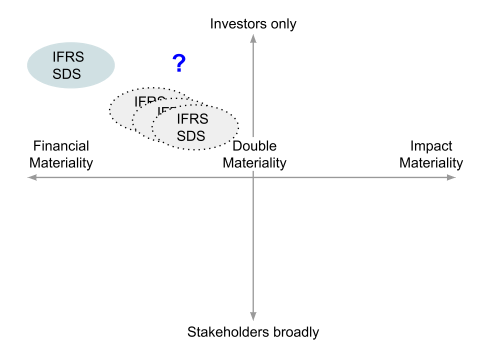
In the rapidly evolving corporate sustainability reporting landscape, the tectonic plates of the corporate report itself appear to be shifting. From connectivity in reporting, to integration in reporting, and to Integrated Reporting, sustainability reporting practitioners – and in fact report preparers more generally – can benefit from better understanding these concepts to glimpse into the future of corporate reporting requirements and prepare for it.
From connectivity in reporting…
The IFRS Foundation is expected to release its first two Sustainability Disclosure Standards (SDS) before the end of June 2023: IFRS S1 General Requirements for Disclosure of Sustainability-related Financial Information (S1) and IFRS S2 Climate-related Disclosures (S2). These are expected to be effective for annual reporting periods beginning on or after 1 January 2024.
Both S1 and S2 include requirements for connected information, in other words, links between sustainability-related disclosures and the financial statements. Preparers using the IFRS SDS will be required to disclose current and forward-looking effects on the company’s financial statements that are due to general sustainability-related (S1) and specific climate-related (S2) risks and opportunities. S1 also requires preparers to “include a description of how the value an entity creates, preserves or erodes for itself and for its investors and creditors is inextricably linked to the value the entity creates for other stakeholders, society and the natural environment.”
Furthermore, in December 2022 the ISSB Staff recommended four key priorities for future work to be submitted for public consultation, one of which was a joint project with the IASB on ‘connectivity in reporting’. This project would help advance the IFRS Foundation’s aim of enabling connectivity between sustainability-related information and financial statements. Importantly, it would build on both the IASB’s Management Commentary project and the Integrated Reporting Framework, the latter now under the purview of the IFRS Foundation since the August 2022 merger of the Value Reporting Foundation.
This initial ‘connectivity project’ aimed to provide clarity about how the different components of general-purpose financial reports fit together, by developing comprehensive disclosure requirements and guidance that enable companies to report connected discussion and analysis of their financial statements and sustainability-related disclosures.
…To integration in reporting
In a turn of events, during the March 2023 ISSB meeting, staff recommended revising the scope and description of this project, expanding from ‘connectivity (of information) in reporting’ to be more broadly focused on ‘integration in reporting’. This project would support the pursuit of integrated disclosures beyond the requirements on connected information contained in S1 and S2, and could also encompass establishing an integrated IFRS reporting framework that integrates disclosures across one or more documents.
This rearticulated ‘integration in reporting’ project – now approved for consultation – will seek to develop guidance to bring together sustainability-related and financial information into a new set of integrated information through which investors and other users of a company’s reporting have a comprehensive, coherent, and concise view of how it creates, preserves, or erodes value. It will also seek to unlock additional layers of value through the practice of integrated thinking and breaking down internal silos by bringing together different sources of decision-useful information in a coherent set of disclosures that minimizes duplication and demonstrates the interdependencies, synergies and trade-offs that exist between them.
However, the project will be rearticulated as an ISSB project that could be pursued jointly with the IASB and could incorporate and build upon concepts from the IASB’s Management Commentary project… but not necessarily.
Why the change?
One of the main objectives of this change to project scope would be to support the pursuit of integrated disclosures beyond the requirements on connected information contained in S1 and S2 and for companies to report sustainability information at the same time, for the same reporting period, and based on the same or consistent underlying assumptions as financial information.
Presumably, it would also be to work on an integrated reporting framework independently of the IASB. One reason for this slight but noteworthy shift could be the desire to maintain applicability of the ISSB standards with “any” financial reporting standards, so that they can be more easily applicable with the US FASB standards. Another could be that the ISSB feels very strongly about advancing an integrated reporting agenda with or without the support of accounting standard-setting bodies. Indeed, it would seem that while the IFRS Accounting Standards Advisory Forum (AFAF) members are supportive of improving connectivity through aligning concepts and terminology between the IASB (financial) and ISSB (sustainability) reporting standards, they prefer to keep an integrated IFRS reporting framework as a potential long-term project. An unfortunate side effect may be the postponement of the equally important initial objective of integrating material sustainability-related information into the Management Report (or MD&A), which seems to us like a natural home for such information.
Isn’t this the same as integrated reporting?
An integrated report is defined as a concise communication about how an organization’s strategy, governance, performance and prospects, in the context of its external environment, lead to the creation, preservation or erosion of value over the short, medium and long term. It should be prepared in accordance with the Integrated Reporting Framework. More importantly, it is part of the process of – and requires – integrated thinking.
The goals of an integrated report are to (i) improve the quality of information available to providers of financial capital to enable a more efficient and productive allocation of capital; (ii) promote a more cohesive and efficient approach to corporate reporting that draws on different reporting strands and communicates the full range of factors that materially affect the ability of an organization to create value over time; (iii) enhance accountability and stewardship for the broad base of (the six) capitals and promote understanding of their independencies; and (iv) support integrated thinking, decision-making, and actions that focus on the creation of value over the short, medium and long term.
Make no mistake, the step up from ‘integration in reporting’ to ‘integrated reporting’ is a big one, primarily because it requires integrated thinking, which is defined as the active consideration by an organization of the relationships between its various operating and functional units and the capitals that it uses or affects, taking into account the connectivity and interdependencies of factors that affect its ability to create value over time. This is the transformation needed of businesses for them to contribute to achieving a state of sustainability. It requires a paradigm shift, from the highest levels of the organization, in how they conduct their activities – sometimes even changing the very nature of these activities – and how they measure performance. It remains elusive today, with only 15% of European companies and only 2% of North American companies producing an integrated report in 2022.
Direction of travel is integration
Is change coming too fast, too soon? One thing’s for sure, the planned ISSB consultation will in effect be feeling out the market’s appetite or readiness for the integration of financial and sustainability reporting!
The evolution in corporate sustainability reporting from a separate, voluntary, and largely unchecked activity to one that is not only standardized and mandatory, but now increasingly integrated to mainstream corporate reporting practices continues to impress. If the ultimate goal is to achieve a state of sustainability, then embedding sustainability into the core of business operations, performance measurement, and accountability (read: reporting) only makes sense, and the ISSB’s project of ‘integration in reporting’ serves to move us in this direction.
This project may also serve to address criticism levelled at the IFRS’s efforts to develop a global baseline of universal sustainability disclosures, in that they are too narrowly focused on investors’ information needs, rather than on those of all stakeholders relevant to a company, and therefore on financial materiality, rather than also encompassing the impacts of a company’s activities on their natural and social ecosystems embodied in a double materiality approach.

| Cheat sheet for easy reference Connectivity (of information) in reporting = the connection between sustainability-related disclosures and financial statements; it creates the conditions for integration by supporting the process of bringing together information that is relevant to value creation. Integration in reporting = a mechanism for bringing together different sources of decision-useful information in general purpose financial reports and combining them to produce a coherent set of disclosures that minimizes duplication and demonstrates the interdependencies, synergies, and trade-offs that exist between them. The process of integration goes a step further than connecting information with the potential for unlocking additional layers of value achieved through the practice of integrated thinking and breaking down internal silos; it creates the conditions for integrated reporting. Integrated reporting = concise communication about how an organization’s strategy, governance, performance and prospects, in the context of its external environment, lead to the creation, preservation or erosion of value over the short, medium and long term; an integrated report is prepared in accordance with the Integrated Reporting Framework and reflects integrated thinking. |
1IFRS: General Sustainability-related Disclosures
2March 2023 Staff paper: Update on Consultation on Agenda Priorities
3December 2022 Staff paper: Projects to be included in Request for Information
4International Accounting Standards Board, which creates the International Financial Reporting Standards (IFRS) used throughout the world except the US
5The objective of the IASB’s overhaul of management commentary project is to enable an entity to bring together, in a single concise and coherent narrative, information about financial, sustainability and other factors that have affected the entity in the reporting period or could affect the entity’s prospects
6December 2022 Staff paper: Projects to be included in Request for Information
7March 2023 Staff paper: Update on Consultation on Agenda Priorities
8Financial Accounting Standards Board, which creates the Generally Accepted Accounting Principles (GAAP) used in the US
9The six capitals are: financial, manufactured, intellectual, human, social and relationship, and natural
